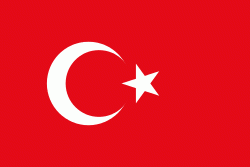Varto (Varto İlçesi)
Varto (Վարդօ, Gimgim, Barzanissa) is a town and district in Muş Province, Turkey.
The population of Varto city is around 13,000 with another 17,000 living in the villages.
The largest population from Varto in Europe is in Berlin.
Some 5,200 Armenians were living in the district of Varto in 1914, including 600 in the town of Varto. Eight churches, 3 monasteries and 5 schools tended to their to spiritual needs. In June 1915 during the Armenian genocide, a great number of Varto's Armenians were massacred in the valley of Newala Ask.
Varto was the site of major fighting during the Sheikh Said rebellion in 1924, and was the epicenter of the 1966 earthquake that killed nearly 3,000 people.
In the 1990s Varto was one of the hotbeds of Kurdish militancy led by the Kurdistan Workers' Party (PKK). Although the city did not see ongoing battles, it was the hometown of many fighters and leading PKK commanders. The Turkish military garrison stationed in the city is surrounded by barbed wire and sandbags. The garrison patrols the city in armored personnel carriers (cars), though there was no fighting in or around the city since the 1990s until August 2015 when fighting between Turkish security forces and PKK began again. Most Kirmancki Zazaki language speakers are Alevis, whereas most Kurmanci Kurdish language speakers are Sunnis. The communities had a separate and quiet existence until the 1980s. There are about a hundred villages in the Varto district.
The population of Varto city is around 13,000 with another 17,000 living in the villages.
The largest population from Varto in Europe is in Berlin.
Some 5,200 Armenians were living in the district of Varto in 1914, including 600 in the town of Varto. Eight churches, 3 monasteries and 5 schools tended to their to spiritual needs. In June 1915 during the Armenian genocide, a great number of Varto's Armenians were massacred in the valley of Newala Ask.
Varto was the site of major fighting during the Sheikh Said rebellion in 1924, and was the epicenter of the 1966 earthquake that killed nearly 3,000 people.
In the 1990s Varto was one of the hotbeds of Kurdish militancy led by the Kurdistan Workers' Party (PKK). Although the city did not see ongoing battles, it was the hometown of many fighters and leading PKK commanders. The Turkish military garrison stationed in the city is surrounded by barbed wire and sandbags. The garrison patrols the city in armored personnel carriers (cars), though there was no fighting in or around the city since the 1990s until August 2015 when fighting between Turkish security forces and PKK began again. Most Kirmancki Zazaki language speakers are Alevis, whereas most Kurmanci Kurdish language speakers are Sunnis. The communities had a separate and quiet existence until the 1980s. There are about a hundred villages in the Varto district.
Map - Varto (Varto İlçesi)
Map
Country - Turkey
 |
|
| Flag of Turkey | |
One of the world's earliest permanently settled regions, present-day Turkey was home to important Neolithic sites like Göbekli Tepe, and was inhabited by ancient civilisations including the Hattians, Hittites, Anatolian peoples, Mycenaean Greeks, Persians and others. Following the conquests of Alexander the Great which started the Hellenistic period, most of the ancient regions in modern Turkey were culturally Hellenised, which continued during the Byzantine era. The Seljuk Turks began migrating in the 11th century, and the Sultanate of Rum ruled Anatolia until the Mongol invasion in 1243, when it disintegrated into small Turkish principalities. Beginning in the late 13th century, the Ottomans united the principalities and conquered the Balkans, and the Turkification of Anatolia increased during the Ottoman period. After Mehmed II conquered Constantinople (Istanbul) in 1453, Ottoman expansion continued under Selim I. During the reign of Suleiman the Magnificent, the Ottoman Empire became a global power. From the late 18th century onwards, the empire's power declined with a gradual loss of territories. Mahmud II started a period of modernisation in the early 19th century. The Young Turk Revolution of 1908 restricted the authority of the Sultan and restored the Ottoman Parliament after a 30-year suspension, ushering the empire into a multi-party period. The 1913 coup d'état put the country under the control of the Three Pashas, who facilitated the Empire's entry into World War I as part of the Central Powers in 1914. During the war, the Ottoman government committed genocides against its Armenian, Greek and Assyrian subjects. After its defeat in the war, the Ottoman Empire was partitioned.
Currency / Language
| ISO | Currency | Symbol | Significant figures |
|---|---|---|---|
| TRY | Turkish lira | ₺ | 2 |
| ISO | Language |
|---|---|
| AV | Avar language |
| AZ | Azerbaijani language |
| KU | Kurdish language |
| TR | Turkish language |















